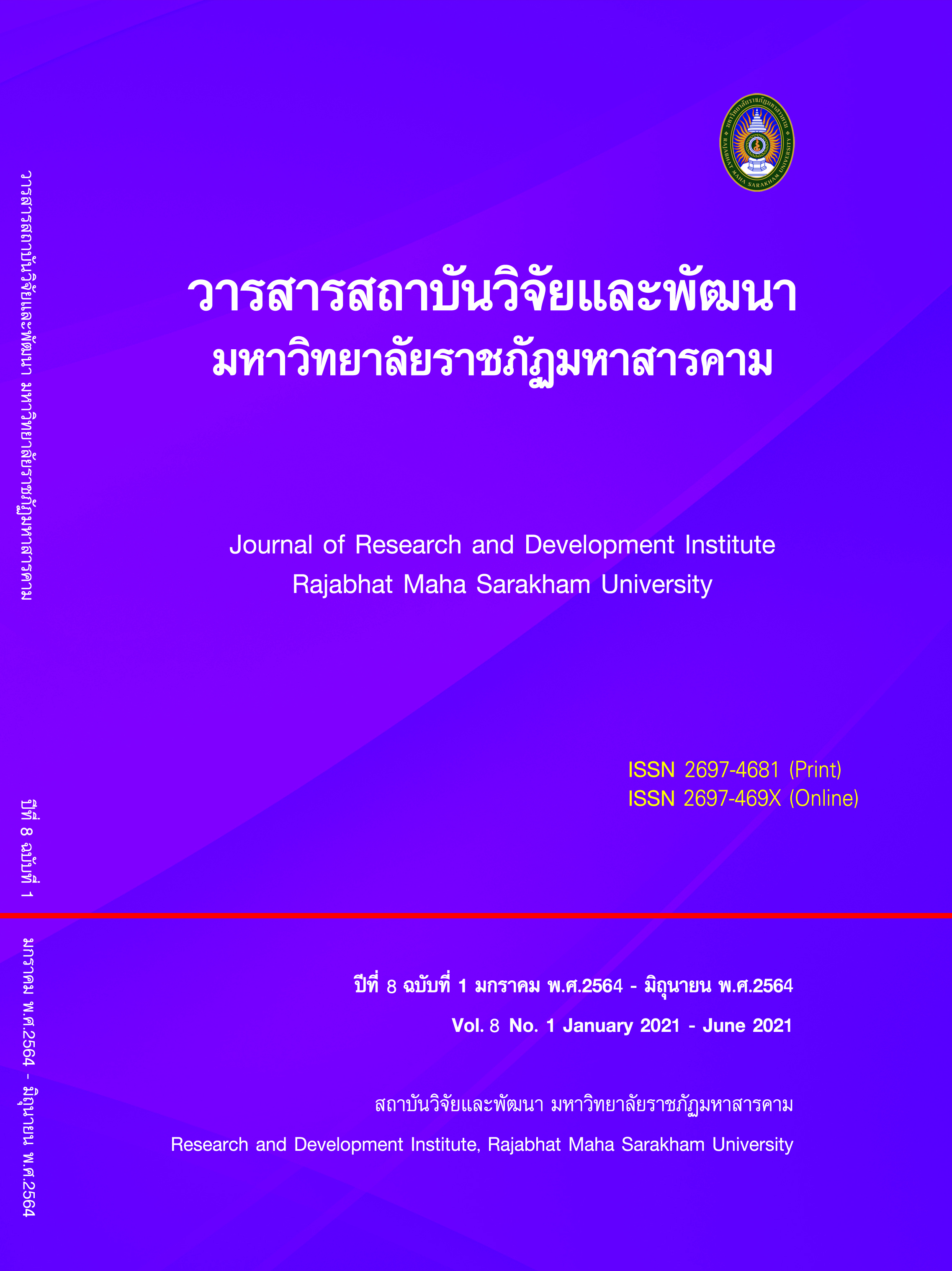Centre of Sufficiency Economy for Sustainable Development in Nongbua Sa- ard Subdistrict Municipality, Buayai District, Nakhon Ratchasima Province.
Keywords:
Learning Center, Sufficiency Economy, Sustainable DevelopmentAbstract
This article aimed to 1) study the community context and sufficiency economy learning center, 2) analyze the potential of the Sufficiency Economy Learning Center, and 3) offera strengthening approach of the Sufficiency Economy Learning Center. In Nong Bua Sa-at Sub District, Bua Yai District, Nakhon Ratchasima Province. The study method used Qualitative Research based on phenomenon, environment or reality context in the community and the potential of the Sufficiency Economy Learning Center. The subjects of this study were selected by the aim of the research (Purposeful Sampling). The research instruments were 1), the collection of documents, 2) in-depth interviews, and 3) Group Interviews. The findings indicated that; 1) Community context, the area had 3 diverse natural forest resources, 3 major water sources, 2 brooks, community networks such as farmers. In addition, there was a learning centers associated with 10 available resources in 10 communities and 1 municipality. 2) Community Potential Analysis Center for Sufficiency Economy Learning Center 4) For the strengthening of the Sufficiency Economy Learning Center by maintaining the resource-rich potential, the study found 4 potentials as follows the potential of the area, the potential of community management, the potential of community activities, and the potential of budget and community organization in Nongbua Sa-ard Subdistrict Municipality. 3) For the strengthening of the Sufficiency Economy Learning Center by maintaining the resource-rich area potential managed with clear division of roles and responsibilities. The communities cooperated and planned to support and facilitate the community in the learning center by adding appropriate public relations channels to make them more well-known, including services and facilities.
References
Adiwatthanasit, C., et al. (1997). Community Research by and for Communitiesin the Integration of ASEAN Economic and Social Community Network. Academic journal Phranakhon Rajabhat university, Vol. 6 No. 2 (2015).
Boonthod, B. (2000). Participation of Community Learning Center Committees in Community Learning Center Operations: A Case Study of Mukdahan Province. Bangkok: National Institute of Development Administration.
Burikul, T. (2008). Participation: concepts, theories and processes. Bangkok: King Prajadhipok's Institute.
Chandaeng, W and Adiwathanasit, C. (2013). Development of a strong community management model according to the sufficiency economy philosophy in the upper central provinces. Nursing Science Journal of Thailand. Vol. 20, No. 38, June, p25.
Chantavanich, S. (2000). Qualitative Research Methods. Bangkok: Chulalongkorn University.
Chantavanich, S. (2013). Data analysis in qualitative research. Bangkok: Chulalongkorn University.
Chinwinitkul, W. (2006). Community learning process Based on Sufficiency Economy Concept: A Case Study of Mai Riang Community, Chawang District, Nakhon Si Thammarat Province. Bangkok: National Institute of Development Administration.
Education Council Secretariat. (2017). National Education Plan 2017-2036. Bangkok: Prik Wan Graphic Co., Ltd.
Giuseppe Catenazzo, Alexandra Epalle, Emanuel Fragniere and Jean Tuberosa (2010). Testing the impact of sustainable development policies in Canton Geneva. Management of Enviromental Quality: An International Journal. Vol 21 No.6 2010 pp 845-861 Emeral Group.
H.Russel Bernard and Gery W. (2010). Analyzing Qualitative Data systematic approach. (14nded). California USA: SAGE Publication.
Inkochasan, A. (2011). Assessing the Potential of Wat Klang Khu Wiang Floating Market as an Eco-Tourist. Bangkok: Silpakorn University.
John W. Cresswell. (2013). Qualitative Inquiry Research Design choosing among five approaches. (3rded). London United Kingdom. SAGE Publication.
John W. Cresswell. (2014). Research Design Qualitative, Quantitative and Mixed Methods Approaches. (4nded). London United Kingdom. SAGE Publication.
Kaewsuwan, W. (2016). Community development according to the Sufficiency Economy Philosophy in the lower central provinces. Journal of Politics and Governance Volume. 6, Issue. 2, P. 55-69.
Nimpanich, J. (2007). Qualitative research in political science and public administration. Bangkok: Chulalongkorn University.
Phannipa, A and Ngamsanit, S. (2016). Insurance business risk management under the supervision of the Office of Insurance Commission according to the sufficiency economy philosophy. Academic Journal of Humanities and Social Sciences Burapha UniversityVolume 24, Issue 45, May-August 2016, p.265-289.
Phanthumnawin, D. (2006). Sufficiency Economy Philosophy and Research for Excellence. NIDA Development Journal 46(1), p.1-19.
Phithakthepsombat, P. (1997). Operating above textbooks social research. (4nded). Bangkok: Sematham University.
Photisita, C. (2013). The science and art of qualitative research. (6nded). Bangkok: Amarin Printing and Publishing.
Phuthet, U. (2016). Developing the potential of the community in the field of lotus products for the development of the community's economic system based on the sufficiency economy. Life Sciences and Environment Journal, Vol. 16, Issue 2, Pages. 201-210.
Prasitratthasin, S and Sukkasem, K. (2008). Quality research methodology Current Problem Research and Future Tense Research. Bangkok: Samlada.
Soodkeeree, J, (2015). Sustainable Community Organization Development Model. Journal of southern technology 8(2) July-December 2015, p. 9-16.
Thongdaeng, S. (2004) The potential of the community in the development of Doi Phu Langka ecotourism Pha Chang Noi Subdistrict, Pong District, Phayao Province. Bangkok: National Institute of Development Administration.
Thongphakdee, N. (2012). Philosophy of Sufficiency Economy: Background and Meaning. Bangkok: S. Charoen Printing.
Tuongnark, N and Mekmuangthong, C. (2007). Research and development of a case study of farmers living according to the sufficiency economy philosophy: a case study in Maha Sarakham Province. NIDA Development Journal 47(1), p.181-193.
Downloads
Published
How to Cite
Issue
Section
License
Copyright (c) 2021 Journal of Research and Development Institute Rajabhat Maha Sarakham University

This work is licensed under a Creative Commons Attribution-NonCommercial-NoDerivatives 4.0 International License.
Articles that are published are copyrighted by the authors of the articles







